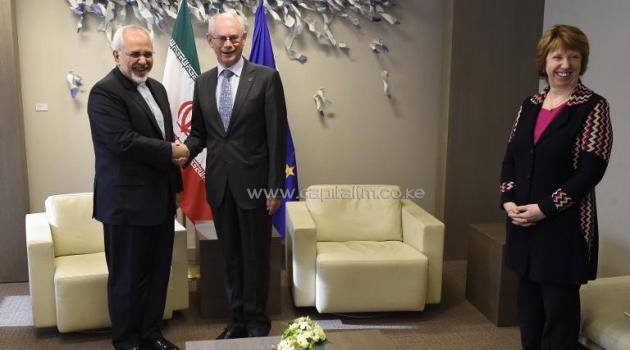
(From L) Outgoing European Union Council President Herman Van Rompuy, Iran Foreign Minister Javad Zarif and EU foreign policy chief Catherine Ashton meet on September 1, 2014 at the EU headquarters in Brussels/AFP
UNITED NATIONS, September 19- Iran and six world powers return to the negotiating table on Friday with only two months left to reach a deal on ensuring Tehran’s nuclear program poses no military threat.
No major breakthroughs are expected at the talks that are to continue until the end of next week, but the pressure is on both sides to find ways to narrow the gaps.
It will be the first meeting between Iran and the so called P5+1 comprised of Britain, China, France, Russia, the United States plus Germany since July when they decided to extend the deadline for a deal to November 24.
“Coming into New York, I think many of us were not optimistic,” a senior US administration official said on the eve of the talks.
“But it is clear that everyone has come here to go to work,” said the official who spoke on condition of anonymity. “It’s tough, very tough.”
The meeting at UN headquarters is held against the backdrop of a US-led campaign to confront Islamist fighters in Iraq and Syria, where Iran wields influence as a key regional power.
Negotiators say hurdles remain in the way of a deal but that holding talks in New York on the sidelines of the UN General Assembly will allow for some high-powered diplomacy to come into play.
EU foreign policy chief Catherine Ashton will open the talks with Iranian Foreign Minister Mohammad Javad Zarif before handing over to political directors for negotiations.
A ministerial-level meeting of the P5+1 with Iran is expected next week and US Secretary of State John Kerry is scheduled to hold bilateral talks with Zarif.
US President Barack Obama last year held a historic phone call with Iranian President Hassan Rouhani, the first direct talks since the 1979 Islamic Revolution, but no contact is planned this time around.
Both leaders face strong domestic pressure to take a hard line on the nuclear issue, which has been a diplomatic headache for more than a decade until a deal was reached last year to try to break the logjam.
“This is an opportunity because everybody’s here,” said the US official. “So we ought to make use of that to try to deal with all of these tough issues.”
– Preventing Iran from ‘breaking out’ –
Western nations agreed to lift some sanctions against Iran last year in exchange for agreement from Tehran to curb nuclear activities and to get to work on a comprehensive agreement.
Negotiators failed to meet a deadline of July 20 but all parties agreed to extend the agreement to November 24 in the hope of getting a final settlement.
While the sides have not ruled out the possibility of another extension, the focus is clearly on beating the clock with a deal by the end of November.
The main sticking point remains Western concern over Iran’s capacity to enrich uranium, a process that can make fuel for peaceful nuclear uses but also the core of an atomic bomb.
Discussions have revolved around scaling back Iran’s uranium enrichment capacity to prevent Tehran from “breaking out” and producing a nuclear weapon.
“I wouldn’t expect any significant breakthroughs at this round of talks,” said Kelsey Davenport, a nuclear non proliferation analyst at the Arms Control Association.
“But I think it will lay the groundwork on the areas that still need to be resolved in the last two months before the November 24 deadline.”
Ahead of the meetings in New York, US Under Secretary of State Wendy Sherman, the lead US negotiator, warned Iran to get serious about negotiating, saying the status quo was not acceptable.
“We remain far apart on other core issues, including the size and scope of Iran’s uranium enrichment capacity,” Sherman said.
“We are committed to resolving this issue,” Zarif told a Washington think tank on Wednesday, but he pointed to US resistance on lifting sanctions as a major stumbling block.









































